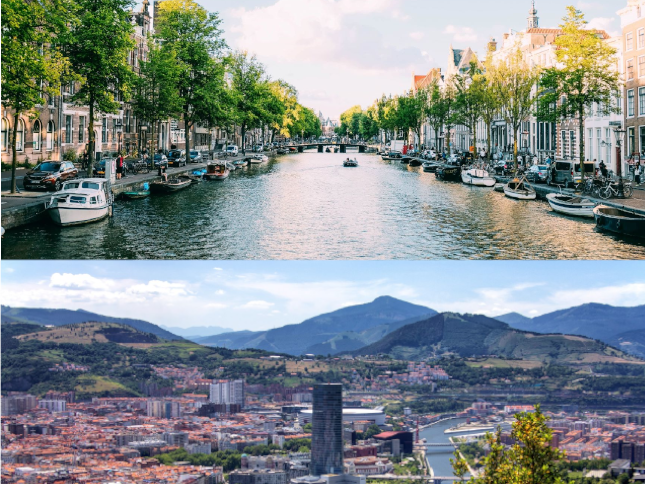ATELIER Smart City project to turn Amsterdam and Bilbao into citizen-driven Positive Energy Districts
ATELIER is all about AmsTErdam and BiLbao cItizen drivEn smaRt cities, aiming to create and replicate Positive Energy Districts (PEDs) within eight European cities. ATELIER will showcase innovative solutions that integrate buildings with smart mobility and technologies to create rather than consume energy in its two Lighthouse Cities Amsterdam (Netherlands) and Bilbao (Spain). ATELIER will thus generate an energy surplus of 1340 MWh of primary energy and save 1,7 kt of CO2 and 23 t of NOx-emissions. The Fellow Cities of ATELIER, Bratislava (Slovak Republic), Budapest (Hungary), Copenhagen (Denmark), Krakow (Poland), Matosinhos (Portugal), and Riga (Latvia), will replicate and adapt the successfully implemented solutions and thus serve as testbeds for future smart cities. On 2 and 3 December, 30 partners working in 10 work packages will come together in Amsterdam for the official kick-off of this five-year project, thus joining the community of overall 17 Smart Cities and Communities Lighthouse projects. "Our vision is to create dedicated PED Innovation Ateliers to strengthen the local innovation ecosystem, and to remove legal, financial or social barriers to the implementation of smart solutions," says Frank Tazelaar, Head of Sustainability at City of Amsterdam. "The Innovation Ateliers will be self-sustaining, continuing for a long time after the project has ended, thus being engines for the upscaling and replication of solutions within the ATELIER cities and beyond (Europe and the World). Moreover, through an active learning programme, we will capture and pass along the lessons learned of our Innovation Ateliers," he adds. To achieve successful implementations of energy saving measures, ATELIER puts citizens at the center of all its activities: residents (<9000), local initiatives and energy communities will be included in decision-making processes and activities and will be strongly engaged in the development of the technical solutions throughout the project. Citizens will be involved in the Innovation Ateliers to create a maximum impact for the PEDs. "With ATELIER, we really want to pave the way for more 'positive' cities in Europe. Therefore, each of our eight involved cities will develop a City Vision 2050 that constitutes the roadmap for upscaling solutions in the long term. The main objective of this is to guarantee a seamless city transformation from planning to implementation and further upscaling and replication," explains Eduardo Zabala of Tecnalia Research & Innovation, leader of the City Vision 2050 work. The ATELIER website www.smartcity-atelier.eu will go online soon but our Social Media channels (Twitter: @AtelierH2020) are already running, thus enabling ATELIER and its partners to communicate and cooperate with the Smart City community and related projects early on. The ATELIER consortium consists of the following members: City of Amsterdam (NL) City of Bilbao (SP) Tecnalia (SP) TNO (NL) Cartif (SP) De Waag Society (NL) Amsterdam University of Applied Sciences (NL) Paul Scherrer Institute (SW) Steinbeis-Europa-Zentrum (GE) City of Budapest (HU) City of Matosinhos (PO) City of Riga (LT) City of Copenhagen (DK) City of Bratislava (SK) City of Krakow (PL) DEUSTOTECH (SP) Cluster de Energía (SP) IBERDROLA (SP) TELUR (SP) EVE (SP) SPECTRAL (NL) Republica Development VOF (NL) Developer Poppies Location (NL) Amsterdam Institute for Metropolitan Solutions (NL) Waternet (NL) DNV-GL (NL) Greenchoice (NL) Civiesco (IT) Zabala Innovation Consulting (SP) Fraunhofer ITWM (GE) Project Coordinator: City of Amsterdam; ATELIER.EU@amsterdam.nl Main Press Contact: Bettina Remmele, Steinbeis-Europa-Zentrum; remmele@steinbeis-europa.de Further information: Twitter: @AtelierH2020 Website: www.smartcity-atelier.eu (online soon)



